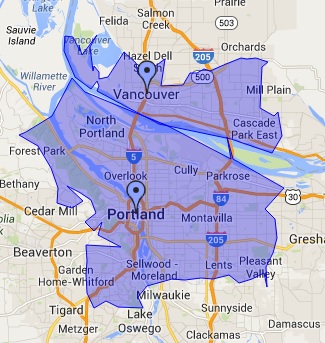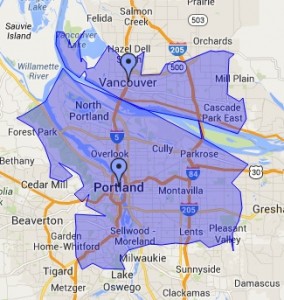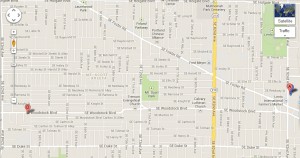
What is the best way to use AdWords geographic targeting, when you have multiple businesses in the same geographic area? If you are a regular reader you already know the answer – It depends! 🙂 The biggest factor being the nature of the business itself. Let’s take a look at a few examples, and examine some of the strategies that may be the “best” approach:
Using AdWords geographic targeting with multiple offices in a metro region:
Take Tom McAvity of Northwest Debt Relief Law Firm for example. He has office locations in Portland, Vancouver, Salem, and Seattle. On the surface, this seems like an easy problem to solve – Create a campaign for each city. Problem solved right? Not so fast captain!
For those of you living outside of Portland, as you can see below Vancouver is essentially a suburb of Portland. The Google machine doesn’t do a very good job of determining location precisely enough to tell the difference between north Portland, and southern Vancouver (or outer north Vancouver for that matter). So how do you make sure that the “right” ad shows for the “right” search query?
Using location modifiers in the keywords sounds like ‘Portland Bankruptcy’ a great idea, but what about a more generic search term such as ‘bankruptcy’, or ‘bankruptcy lawyer’? How can you be certain that on Washington side of the bridge a user sees a Vancouver ad, and on the Oregon side of the bridge a user sees a Portland ad? You can’t.
The “best” thing you can do in this situation is to make sure that you have a campaign that covers both overlapping regions, with more generic “Portland Metropolitan Area” ad text. Whether in addition to, or instead of the more traditional “highly targeted” city campaigns.
As long as your website allows for simple, easy, comprehensive navigation, you will know that regardless of the location or KW query that your potential customers can find the specific office contact information they are looking for.
A local service company with two different stores in the same metro area:
A great example of this is our friends at The Floor Store, and Carpet Outlet. Both locations are within the same neighborhood (ish), in the same city. The difference between the two is essential retail vs. wholesale. (Although there are overlapping services (installation) and products – carpet is “flooring” after all.)
So, how do you not only make sure the right ad is showing for the right term, right location – But, also avoid violating Google’s double serving policy?
Keep ’em separated!
Add ‘carpet’ (and close variations) as negative broad match terms to the account level negative keyword list of The Floor Store, and add ‘flooring” (and close variations) as negative broad match terms to the account level negative keyword list of Carpet Outlet. Granted, this is as imperfect of a solution as any, but if BOTH accounts get suspended for violating the double serving policy, you’re not advertising at all!
If each site in this example has simple, easy, comprehensive navigation, to find links to the other – Then even if the “wrong” ad is served for a particular query, the user can still find what they are looking for.
A company with multiple agents/sales reps competing with each other in the same metro area:
This is the WORST case scenario! There may not be any way you can really “win”, because someone is always going to be upset about the reality of the limits of AdWords geographic targeting.
The best thing you can do in this case is to target the entire service area, and land all the ads on a “generic” page of the site. (Such as the homepage, a regional page, a “survey” form page, etc.) Who gets what leads should depend on factors above and beyond which user saw which ad. You have so many more opportunities to sort out who the “right” agent is for this particular customer on site than you will ever have through AdWords geographic targeting options.
As long as the site has comprehensive navigation, and clear messaging, you have a chance to convince the potential customer post-click that they have in fact found the “right” ad given the needs expressed in their search query.
Summary:
There are never any “perfect” options when it comes to geographic targeting and AdWords. The most important thing you can do when determining your geographic targeting strategy is to always keep your advertising goals in mind. Don’t assume anything about your customers and the “right” locations to target with your advertising – Use the data that presents itself through your geographic reports to know, for a fact, “where” according to the Google machine your most valuable customers are located.
Yes, when it comes to PPC advertising you will always pay for some percentage of “bad” clicks. But then again, not everyone who sees a television commercial, or hears a radio spot rushes out the door to buy your product/service right away! You shouldn’t expect every click to result in an immediate sale or conversion.
As long as you are getting users in your target demographics from your target market visiting your site, calling on the phone, or walking in the door, your advertising is working! Don’t short yourself of interested and engaged potential customers, due to assumptions as to whether or not they are in the “right” geographic location, based on what the AdWords geographic targeting options look like in the AdWords interface.






